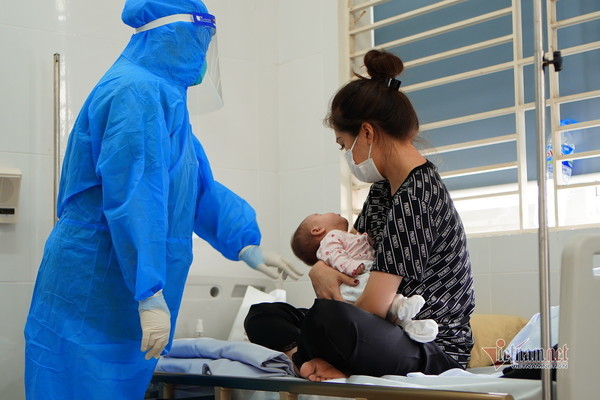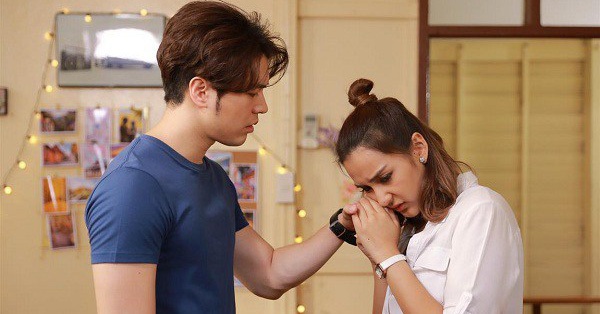Long-term or post-Covid-19 Covid-19 syndrome is an abnormal health symptom with no known cause, occurring after 4-12 weeks of recovery, as defined by WHO.
Pak Loc, 62, in Ho Chi Minh City, contracted Covid-19 in January, symptoms of coughing up phlegm, shortness of breath, chest pain, SpO2 measurement (capillary blood oxygen concentration) sometimes dropping to 92%. The doctor instructed to treat at home, take medicine, give oxygen support, lie on his stomach, pat on the back, shortness of breath gradually improved. A week later, he tested negative, no symptoms.
Almost two months after recovering from his illness, Mr. Loc coughed again, had green phlegm, had a fever of 39-40 degrees, was tired, had difficulty breathing, his left leg was swollen, painful, hot, and difficult to move. Doctors diagnosed a blood clot in his left leg that led to venous thrombosis and severe pneumonia, with nodular fibrosis – a long-lasting sequela of Covid. The patient was hospitalized, treated with antibiotics, anticoagulants, oxygen support, physical therapy…, the blood clot in the leg veins dissolved, the veins reopened, and the inflammation in the lungs disappeared. At home, Mr. Loc continues to take anticoagulants, do breathing exercises, take nutritional supplements and have a re-examination according to the doctor’s appointment.
Huynh Thu Ngan, 27 years old, an office worker in Ho Chi Minh City, after recovering from Covid-19 experienced a lot of hair loss, headaches, shortness of breath when climbing stairs, prolonged fatigue… but it didn’t go away. to the doctor. He said that several years ago he had dengue fever, pneumonia, and had a similar situation, and soon after. Therefore, this time Ngan increased his yoga practice, added vitamins and minerals, went to bed earlier, and the unpleasant symptoms gradually decreased.
However, Ngan’s parents in Quang Nam didn’t think so. “My parents were more afraid of sequelae than contracting Covid,” Ngan said. His parents had a relatively mild Covid-19 infection, were negative, had no underlying illness, and were still coughing and having headaches. The grandparents and 5 relatives decided to rent a car to Ho Chi Minh City to check for sequelae.
Recently, all countries recorded a number of cases of severe post-Covid-19 sequelae, such as: stroke brain infarction, Pulmonary embolism cause cardiac arrest, lung damage, fibrosisWell ventilator dependence… Mid-March, Thanh Nhan General Hospital, Hanoi, 62-year-old female patient dead due to severe lung damage. Doctors believe that many people are subjective with prolonged, severe Covid symptoms, late hospitalization, and difficulty in treatment, like the two patients above. Many others worry too much, going to the doctor after recovering from an illness even though there are no unusual symptoms.
Doctor Nguyen Nhu Vinh, Head of Respiratory Function Investigation Department, Ho Chi Minh City Hospital of Medicine and Pharmacy University, said that in recent months, the Post-Covid-19 Clinic has received hundreds of patients every day. Some cases have mild sequelae, some have no symptoms but do not understand properly about the post-Covid-19 situation, are too worried and afraid to go to the doctor. Of the approximately 7,000 patients who were hospitalized recently, only 10 needed to be hospitalized for post-Covid-19 care. Most of them are elderly, have diabetes, cardiovascular disease, cancer, have to breathe oxygen during the acute phase of Covid, some young people have mild disease.
Doctor Vo Ngoc Anh Tho, Deputy Head of the Department of Tropical Diseases, Cho Ray Hospital, said worldwide studies showed that 80% of F0 had at least one abnormal symptom in the first 4 weeks of Covid, such as fatigue, cough. , chest tightness, hair loss, insomnia, difficulty concentrating, headaches… They are not life threatening, can be self-corrected and cured by the body within three months. The best chance for recovery is within the first month after recovering from illness.
“People with severe post-Covid-19 sequelae have a low percentage,” said Dr. tho. Serious and potentially life-threatening post-Covid-19 sequelae include: Lung damage (pulmonary fibrosis, atelectasis); cardiovascular (increased blood clotting leading to blood clots leading to stroke, myocardial infarction, pulmonary embolism); kidney damage; neuropsychiatric sequelae (insomnia, headache, anxiety, depression). Especially in children, MIS-C syndrome may appear.
Health problems that occurred after Covid-19 It is still considered a scientific phenomenon by the World Health Organization (WHO). can’t explain. Usually, people recover from Covid-19 after two to six weeks. In some people, the virus causes symptoms that last for weeks or months after a negative test. People who are not hospitalized or have mild disease may also experience persistent symptoms, some developing complications with long-term health effects. WHO mentions post-Covid-19 health problems Post-Covid Symptoms or Prolonged Covid syndrome (long covid).
Since February 2021, WHO has held numerous international consultations with experts to produce a general concept of this condition and its subtypes. The WHO’s definition of Persistent Covid-19 is: “A post-Covid condition that occurs in a person with a history of nCoV infection, usually three months from the onset of Covid-19 infection, symptoms persisting for at least two months, cannot be explained by a diagnosis.”
WHO noted that more than 200 post-Covid symptoms have been reported. There, three symptoms Common symptoms include fatigue, dyspnea, and cognitive dysfunction. Symptoms that interfere with daily life, may begin after recovery or survive an acute infection, may change and recur over time.
The development of the Covid-19 disease is divided into three phases. The acute phase is when a rapid test is positive, usually around 4 weeks. From 4 weeks to 12 weeks is the stage where Covid-19 is still ongoing, the test is negative but the disease is not fully cured. After 12 weeks is considered the post-Covid-19 period. Thus, Longlasting Covid Syndrome covers the advanced and post-Covid-19 phases, i.e. from 4 weeks to 12 weeks or more.
The US Centers for Disease Control (CDC) calls Persistent Covid-19 Syndrome a “Post-Covid-19 Condition”. In Vietnam, the terms post-Covid-19 or Covid-19 are used equally, from 4 weeks to 12 weeks or more, according to Dr. Vinh.

Doctor Vinh listens to the heart and lungs of a patient who came for a post-Covid-19 check-up. Photo: English Letters
“According to the WHO definition, the number of people who actually have a prolonged Covid-19 syndrome in Vietnam is not large,” said Dr Vinh. However, many patients still recommend “testing for peace of mind.” “In this case, testing is not necessary. , waste of money and time and psychological stress on patients,” said Dr. Vinh.
Doctor Tho also said many people who have the mentality of “blaming” health disorders due to Covid-19 but ignore the real causes of other diseases. For example, they have a background of high blood pressure, diabetes, and heart disease. After Covid, unfortunately, they had a stroke which they considered the “culprit” as a sequelae. Therefore, instead of post-Covid-19 checkups, people with underlying medical conditions should have regular medical checkups to diagnose and have a proper treatment plan.
Experts advise that people who have no symptoms, continue to work and live normal lives, do not need to see a doctor after Covid-19. If symptoms of fatigue, cough, sore throat, hair loss, difficulty sleeping, heavy breathing, palpitations… persist after 4 weeks, you should see a doctor. If you have any of the following symptoms: Difficulty breathing, coughing up blood, SpO2 drops below 94%; left chest pain with increasing pain; severe headache, accompanied by vomiting, weakness of limbs, facial paralysis; severe stomach pain; or a child with a high fever that doesn’t go down, lethargy, difficulty getting up, red rash on the body… need to go to the hospital immediately.
“Absolutely not self-medicating, buying drugs of unknown origin or quality for self-healing after Covid,” said Dr Tho.
Thu Anh – Thuc Linh
at Blogtuan.info – Source: vnexpress.net – Read the original article here



